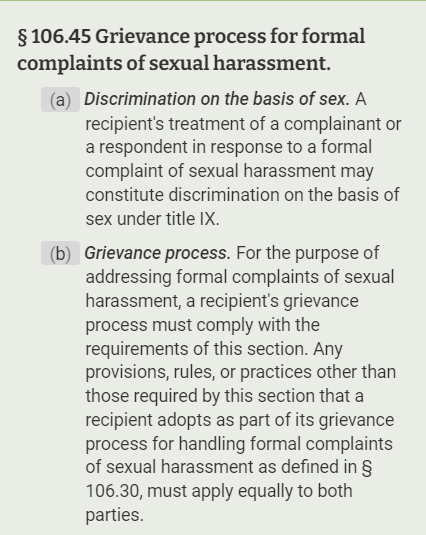
Title IX Attorney for K-12 Education
Title IX is a federal law that prohibits sex discrimination in education programs or activities that receive federal financial assistance. This law applies to all levels of education, including K-12 schools.
In K-12 schools, Title IX requires that schools provide equal opportunities for both male and female students to participate in all educational programs and activities, including sports and extracurricular activities. Schools must ensure that they do not discriminate on the basis of sex in any aspect of their educational programs or activities.
Title IX also prohibits sexual harassment, including sexual assault, in K-12 schools. Schools must have procedures in place for addressing and resolving complaints of sexual harassment and must take prompt and effective action to address any reported incidents. Schools that receive federal financial assistance are required to comply with Title IX. This includes public schools and many private schools that receive federal funding.
Kelly & Kelly P.C. has extensive experience handling legal matters involving elementary schools, school districts, and institutions for higher education. We provide legal counsel for individuals as well as administrative bodies. This includes extensive experience representing students for school related offenses.
Role of a Title IX Attorney
A Title IX attorney is a legal professional who specializes in cases involving Title IX, a federal law in the United States that prohibits sex-based discrimination in educational programs and activities receiving federal financial assistance. Title IX attorneys can represent clients in various capacities, depending on the nature of the case and the needs of the parties involved. Some common roles and responsibilities of a Title IX attorney include:
Advising clients: Title IX attorneys provide guidance and advice to students, faculty, staff, or institutions on their rights and responsibilities under Title IX. They help clients understand the law, the processes involved in filing or responding to a complaint, and potential outcomes of a case.
Representing clients in investigations: When a Title IX complaint is filed, an investigation is typically conducted by the educational institution or an external investigator. A Title IX attorney can represent either the complainant (the person alleging the violation) or the respondent (the person accused of the violation) during the investigation process, ensuring that their client’s rights are protected and that they have a fair and unbiased opportunity to present their side of the story.
Advocating during grievance procedures and hearings: In some cases, Title IX complaints proceed to grievance procedures and hearings, where the parties involved may present evidence and make arguments to support their case. A Title IX attorney can represent their client during these proceedings, presenting arguments and evidence, questioning witnesses, and making sure that the process is conducted fairly and in compliance with applicable laws and regulations.
Negotiating settlements or resolutions: Title IX attorneys may work to negotiate settlements or resolutions between the parties involved in a Title IX case, helping to reach a mutually agreeable outcome without the need for further legal action or a formal hearing.
Litigating in court: If a Title IX case is not resolved through internal processes, negotiations, or settlements, a Title IX attorney may represent their client in a lawsuit filed in state or federal court. This could involve arguing the case before a judge or jury, presenting evidence, and advocating for their client’s rights and interests.
Advising and training educational institutions: Title IX attorneys may also work with educational institutions to develop and implement policies and procedures related to Title IX compliance. They can provide training and education to faculty, staff, and students on Title IX issues and help ensure that institutions are meeting their legal obligations.
Staying up-to-date with legal developments: Title IX attorneys must stay informed about changes in laws, regulations, and guidance related to Title IX, as well as court decisions and trends that could impact their clients and the cases they handle. This knowledge enables them to provide accurate and current advice to clients and effectively represent them in legal proceedings.
Title IX Complaints
Title IX complaints can involve a wide variety of discrimination issues such as sexual harassment, gender-based discrimination, unequal treatment of male and female students, and sexual violence. If a complaint is found to have merit, the school may be required to take corrective action and may be subject to penalties.
Title IX Sanctions & Penalties
When it comes to a student violating Title IX certain sanctions/remedies may be imposed such as,
- Removal from the academic program
- Referral for counseling
- Changes in classrooms
- Educational accommodations
- In more extreme cases, referral to law enforcement
Title IX Investigator
The investigator in Title IX cases acts as a “fact finder” in that their role is to interview both parties in a neutral manner and prepare a final report after all parties have been interviewed. The investigator does not decide whether or not there’s a violation; they simply investigate both sides of the story and provide an unbiased report to the decision maker.
Title IX Complainant
The complainant in Title IX cases is the alleged victim. This is typically a student, although it may also be a teacher, staff member, or school administrator. The complainant is the individual or group of individuals who are claiming that there was a violation to their civil rights and that the school should be held responsible for this violation.
Title IX Respondent
The respondent is named by the complainant as the alleged actor who has committed a Title IX violation. The respondent has the right to be represented by legal counsel as does the complainant.
Title IX Investigations
A Title IX investigation is a process that takes place when a complaint is filed alleging a violation of Title IX. The investigation typically involves interviews with the complainant, respondent, and any relevant witnesses, and may include a review of documents, such as emails, texts, and other forms of communication. The goal of a Title IX investigation is to determine whether a violation of Title IX occurred and, if so, what corrective measures should be taken.
Title IX Complaints
Title IX complaints can involve a wide variety of discrimination issues such as sexual harassment, gender-based discrimination, unequal treatment of male and female students, and sexual violence. If a complaint is found to have merit, the school may be required to take corrective action and may be subject to penalties.
What is The Timeline for Title IX Investigations?
The entire process from the time a Title IX investigation is initiated to the time a decision is rendered typically is an average of 4-6 months.
The decision maker for Title IX Investigations is typically referred to as the Title IX Coordinator or Title IX Hearing Officer. This individual has 10 days to render a decision. With that said, this process can be extended for “good cause” such as filing a police report, collateral student misconduct investigations, language barriers, etc.
Also, even if it’s not a Title IX violation, the decision maker can find that it’s a violation of the student’s rights via the Michigan Revised School Code which may include suspension or expulsion.
What does Title IX Cover?

Under Title IX, students attending schools receiving federal funding are entitled to certain rights, including protection against discrimination and other types of violence while in attendance of these institutions. Part of this is the requirement that schools must have a published policy against sexual discrimination, which must be clearly posted for every student to be able to see. In addition to this, every school must have a Title IX Coordinator who is responsible for ensuring that the school is in compliance with Title IX.
The final part of the Title IX requirement for schools is having a procedure in place for students to be able to file sexual assault and discrimination complaints. This means the students must be able to file a complaint with the school directly if they feel they are a victim of sexual assault or discrimination. The procedures for this must be clear and known to all students, with regular updating of students as to the progress of the complaint.
Filing for a Lawsuit
Lawsuits and complaints surrounding Title IX can be filed by any individual who feels they are a victim of sexual discrimination at a school supported by federal funding. While legally this can be done by any individual, most people are unfamiliar with how the process works, especially if the suit is being filed in federal court. For this reason it is strongly recommended to be completed by an experienced school law attorney in order to have the best possible outcome.
The school attorneys at Kelly & Kelly P.C. have many years of experience working with cases involving Title IX as well as school issues. Our expert school lawyers will examine your particular case and come up with the best possible game plan for achieving a successful legal outcome. If you or someone you know is in need of legal assistance in a Title IX case, please contact our office today for a consultation.
Call Our Team: 248-348-0496
After Hours: 248-733-5021
Email Michael Kelly

To have one of our experienced attorneys contact you, please fill out our confidential form below.
"*" indicates required fields




